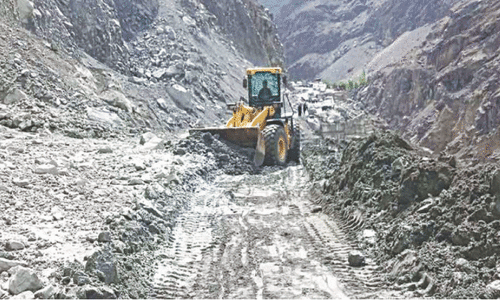SUKKUR, Nov 11: Shortage of water at the Sukkur barrage has become 29 per cent, instead of 14 per cent as is being claimed by the Irsa authorities.
Irrigation sources said the water shortage would affect sowing of the Rabbi crops in Sindh.They said that the indent of the Sukkur barrage during the first 10 days of November was 30,000 cusecs, but its canals were receiving 22,000 cusecs water for five days, raising the shortage to 29 per cent.
Irsa in its meeting held in Islamabad last month had claimed that during the Rabbi season only 14 per cent water shortage was expected at barrages of Sindh.
The claim has proved wrong and water shortage at the Sukkur barrage was 29 per cent during the first ten days of November.
According to irrigation experts, if the situation remained unchanged, then an acute water shortage could take place in the canals of the barrage especially at the left side which could badly affect sowing of the Rabbi crops.
Irrigation sources said that at present the Rice canal was close, while the Dadu canal was getting 1,850 cusecs water, and Khirthar canal was getting 2,120 cusecs, Rohri canal was flowing with 4,930 cusecs, Nara canal was having 11,150 cusecs, Khairpur East Feeder canal was taking 1,525 cusecs, and Khairpur West canal was taking 1,115 cusecs water.
On Saturday evening, water level at the upstream of the Sukkur barrage was 35,403 cusecs and downstream was 10,708 cusecs.
The upstream at the Guddu barrage was 45,982 cusecs and downstream was 37,960 cusecs.
The Kotri barrage upstream was 9,832 cusecs.
No water is being released below Kotri.
PUNJAB’S WASTE: Thousands of acres of agricultural land in Sindh has rendered barren due to inflow of poisonous water carrying chemical waste from Punjab.
According to reports, poisonous water from factories of Punjab carrying chemical waste is entering the River Indus through Malook Wali Tarai near Daharki.
As a result, thousands of acres of agricultural land has gone barren while hundreds of cattle had died after consuming the poisonous water.
Besides, the poisonous water was also proving hazardous for the birds and other animals.
Hundreds of inmates of different villages, including Khair Mohammad Pitafi, Ali Gohar Panhyar, Abdullah Fakir Bhiyo, Ismail Bhiyo and Yousuf Mahar, have shifted to safer places as the release of chemical waste from Punjab has converted underground water as poisonous.
The area people have fallen prey to malaria, gastroenteritis and hepatitis.












































